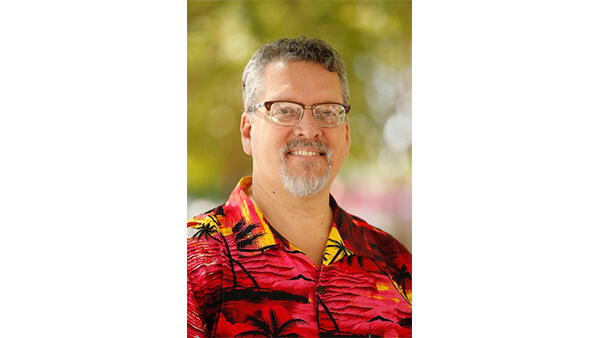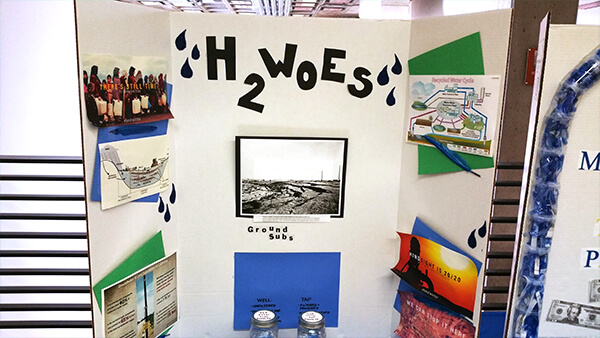This winter’s rains have eased concerns about the drought, but water remains a vital component to the Valley's future, and that's why Dr. Frederick L. Nelson, assistant professor of science education, invests his time and effort in Fresno State’s Water Cohort .
"The mission of the Fresno State Interdisciplinary Water Cohort is to engage the campus and community in discussions and activities to build awareness and develop understanding of water issues and challenges – in order to incite action, address issues and collaborate to construct water solutions for the Central Valley and worldwide," he said.

|
|
Dr. Frederick L. Nelson
|
Nelson, a recipient of the 2015 Provost's Award for Promising New Faculty, is the project director of the Strategic Teacher Education Partnership. He is also co-coordinator of Liberal Studies and a DISCOVERe Faculty Fellow.
The hiring of a dedicated group of faculty who would engage in scholarly activity on the topic of water began in 2012 under the leadership of then-Provost William Covino. Provost Lynnette Zelezny and Vice Provost Dennis Nef have since provided meaningful support for the project.
"Our cohort includes faculty from the fields of geosciences, journalism, agriculture, education, geography and others, resulting in a diverse set of expertise and interests," said Nelson. "We spent quite a bit of time exploring what we might do … and arrived at the Reading About Water project as an appropriate vehicle for our interdisciplinary work."
Through the Reading About Water project – now in its third year – the cohort engages faculty from across the University in the integration of reading from a common text into their courses.
"We have involved hundreds of students in every college and school on campus in developing awareness of issues about water," Nelson said.
Many students who participated in the project reported making meaningful changes to their personal use of water. Examples from a survey taken include: "I found myself using a great deal less water at home, so much that my water bill was less than $20 last month," and "Now I turn off the water when I brush my teeth and when I shampoo in the shower."
The Water Cohort also has received grant funding through the CSU’s Water Resources and Policy Initiatives program to explore different possibilities. A narrative describing its early efforts, “Seven Faculties in Search of a Mission,” was published in 2016 in the Journal of Environmental Education and Communication.
"We are dedicated to the construct of water literacy, meaning that students will understand fundamental concepts about the properties of water, water quality and quantity, and recognize the complexity of issues related to water use and the need for complex solutions," Nelson said.

|
|
Student poster from Dr. Mara Brady's Earth and Environmental Science course on display in the Henry Madden Library during the 2016 Student Water Showcase.
|
The Water Cohort selects books for its Reading About Water project that appeal to a broad range of faculty and student interests.
"For this year, we wanted a book that will have appeal particularly to faculty and students in the humanities. “Blue Mind” by Wallace J. Nichols takes us on an exploration of why interacting with water makes us happier," said Nelson.
The interdisciplinary Water Cohort aims to educate a new generation of citizens who are informed and prepared to make the difficult decisions that need to be made.
"We live in the most productive agricultural region in the world, but that region receives an average annual rainfall on the order of 11 inches," said Nelson. "Water problems are frequently presented in simplistic terms, as a choice between agriculture or the environment, food or fish. As we drive up and down Highway 99, we see many signs that suggest that there is a big faucet that needs to be turned on to solve all of our water problems. Even with more precipitation in this year, we are still in a drought of historic proportions."
One goal of the Reading About Water initiative is to establish a critical mass of interdisciplinary faculty members who feature Reading About Water each year in their courses, impacting the development of water literacy for every Fresno State student.
"Our long-term goal is the development of an undergraduate, general education course focusing on water literacy," said Nelson. "This course would be taught by an interdisciplinary team of faculty, and would be a highly interactive learning experience, utilizing activities such as service-learning and project-based learning, resulting in students’ recognition of the multiple perspectives associated with water issues."
In the end, the future of the Valley could be at stake.
"We truly want Fresno State to be recognized as a 'water university,' not only a hub of water technology and industry, but one where all students have achieved water literacy," said Nelson.
|




